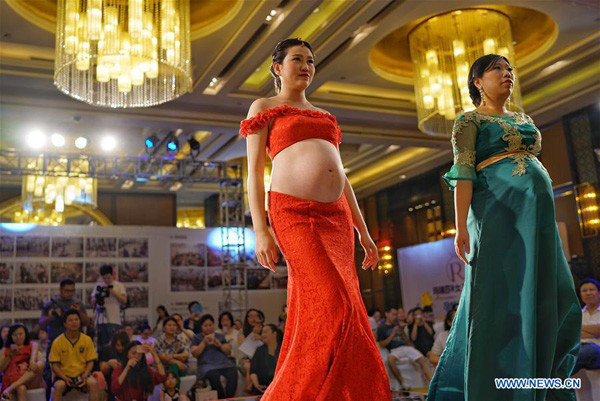
Pregnant women take part in a fashion show in Chongqing, southwest China, May 5, 2016. (Photo/Xinhua)
A draft of general rules stipulating basic principles of the country's Civil Code has been submitted to the top legislature for its first reading on Monday.
The National People's Congress Standing Committee will consider the draft general rules, an early step towards a more robust civil code, at its bi-monthly session, which runs until Saturday.
Currently, China has no civil code, a collection of laws designed to cover the private sector, and lawmakers have decided to make a civil code in several steps. The first step is drafting the general rules, which began in March 2015.
The draft general rules are expected to be approved in March 2017 and the whole civil code adopted in March 2020, said Li Shishi, head of the Standing Committee's Legislative Affairs Commission.
The code is important in modernizing state governance and safeguarding people's interests, Li said, and it will also help the economy.
The following are the highlights of the draft general rules and interpretations from experts.
1. Fetus to have civil rights
A fetus has not yet been born, but the father died. Does the fetus have the right to inherit the father's property? A pregnant woman's rights have been infringed in the food safety and environmental pollution cases, and except for the woman, does the fetus also have the right for compensation?
Draft: A fetus has the capacity for civil rights in cases relating to the protection of the fetus' interests, such as inheriting properties and receiving grants. But, when the fetus is not alive at birth, the civil rights do not exist from the beginning.
Interpretation: The development of a country or a region's legal civilization relies on the protection of vulnerable groups and the people-oriented legislation concept, said Wang Yi, a law professor at the Renmin University of China.
A fetus could not protect its self-interests, and the laws protecting the fetus' rights demonstrate the developing of the legal civilization, Wang said.
2. Six-year-old children to have limited capacity for civil conducts
Buying soy sauce is a simple civil conduct. But how old does a child need to be to carry out the conduct that is under legal recognition and protection? The current Chinese laws set the lowest age at 10.
Draft: Minors aged between 6 and 18 are persons with limited capacity for civil conducts. They can independently carry out civil acts purely to benefit, or civil acts suitable for their age and intelligence.
Interpretation: Following social and educational development, children aged six have some cognitive and judgment abilities, and they should have the right to do some civil conduct, Wang said. The age change will better protect children's interests.
Children have their own interests, and they are able to decide their behaviors according to their own will, and the adults cannot impose their wills on them, he said. If children do not like the names given by their parents, they could ask for changes.
Other law experts said the age limit change was also due to the country's compulsory education age limit of six.


















































